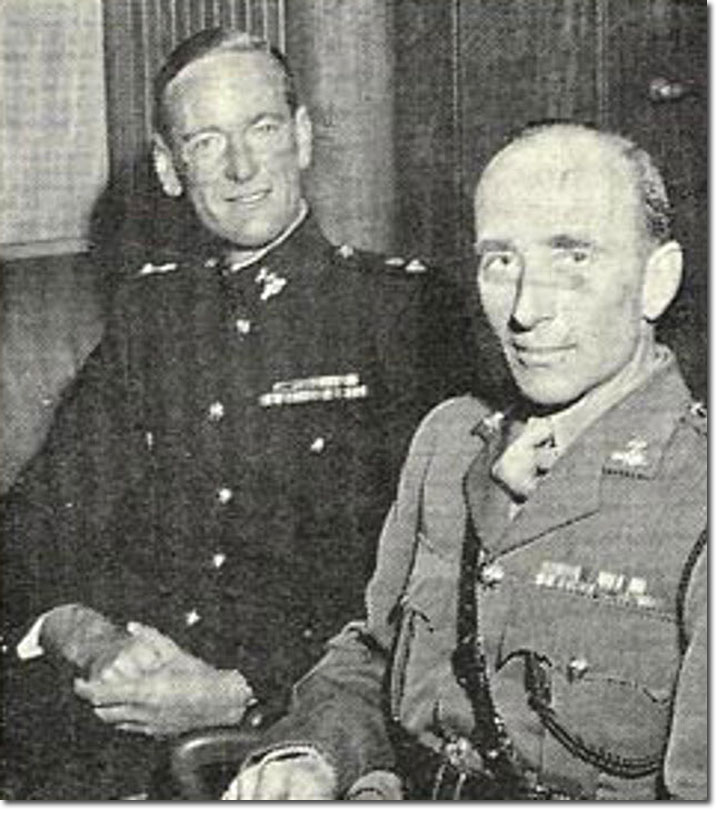|
|


|
| Richard Heathfield Dendy was commissioned into The Buffs in 1937, went with them to Palestine but spent a large part of the war as a prisoner of the Germans after being captured in the Western Desert. After the war he held staff appointments and was appointed CO of the Buffs Depot at Canterbury in 1953. In 1955 he was 2nd in command of the 1st Battalion and took over command in July 1959. In 1960 the regiment returned to the UK from Germany, and in 1 Mar 1961 The Buffs amalgamated with the Queen's Own Royal West Kents and he was the first CO of the Queen's Own Buffs. He held this appointment until 2 Feb 1962 when he handed over command to Lieut-Col Henry 'Blick' Waring MBE who is seated on the right in this photo. Colonel Dendy died on 16th December 1993. |

|
| Colonel Richard Dendy, who has died aged
76 was one of the few survivors
of the Battle of Alemhamza
in Libya.
On Dec 15 1941 his regiment, the First Buffs, was attacked by 40 German tanks and a brigade of infantry. The Buffs had seized Point 204, a key position. and by holding on to it disrupted Rommel's plans and subsequently caused him to fall back beyond Benghazi. Although lacking air and tank support, the Buffs did not yield an inch of ground until they and the supporting 31st Field Regiment RA were overrun. Dendy, who was adjutant, displayed great calm and destroyed all codes and secret papers be fore he was taken prisoner. Dendy made various attempts to escape - first from Capua, where he tried to mingle with Italian railway workers and board a train . He was later transferred to other camps and finally to Germany. A teaplanter's son, Richard Heathfield Dendy was born in Ceylon on Sept 28 1917 and educated at Radley and Sandhurst. Commissioned into the Buffs (Royal East Kent Regiment) in 1937, he joined them in Lucknow. Soon afterwards the regiment moved to Palestine to engage in anti-terrorist duties and Dendy was mentioned in despatches. On the outbreak of war the regiment moved to Egypt. On his release in 1945 Dendy served in various regimental postings , including a stint as a company commander in the operations against the Mau Mau in Kenya from 1953 to 1954. The going was hard: dense foliage that kept out the light; heat by day and icy mist by night : hippos and rhinoceros which charged down the narrow tracks. and wild buffalo which attacked without warning. But the Buffs earned high praise for their successes in meeting the terrorist threat. In 1955 Dendy beca me second-in-command of the 1st Buffs at Wuppertal, Germany. He then moved to Aden, where the Buffs fou ght in mountainous country a longside the Aden Levies against hostile Yemenis and opportunistic tribesmen. In 1959 Dendy was promoted lieutenant-colonel and the next year took the regiment to Denmark for its first a d only visit although the Danish connection had existed since 1689 and the Kings of Denmark later became the Colonels-in Chief. In 1961 he was the last CO of the 1st Buffs and the first of the Queen's Own Buffs. formed by the Buffs amalgamation with the Queen's Own Royal West Kent Regiment. The RWK dates from 1757 and the Buffs from 1655. (although they trace their origins to the Elizabethan Trained Bands who wore buff jerkins). They were the first to be given the privilege - rarely exercised - of marching through the City of London with drums beating and colours flying. Richard Dendy was the ideal man for the post and proved adept at easing the tensions which arise when two regiments of long traditions are amalgamated. He was married and had two sons and a daughter. |
Regimental Details | Commanding Officers
Armed Forces | Art and Culture | Articles | Biographies | Colonies | Discussion | Glossary | Home | Library | Links | Map Room | Sources and Media | Science and Technology | Search | Student Zone | Timelines | TV & Film | Wargames